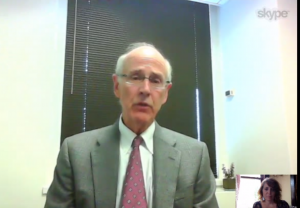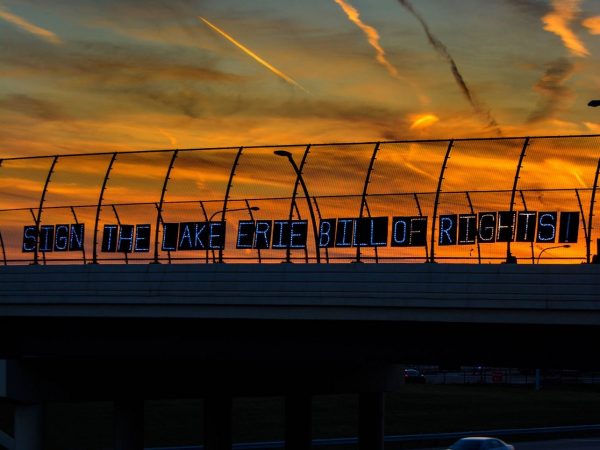
In August we shared the news that members of the Great Lakes and St. Lawrence Cities Initiative, a group comprised of over 120 U.S. and Canadian mayors, have come forward in opposition to the decision of Great Lakes Governors to approve Waukesha, Wisconsin’s request to divert Lake Michigan water into their water system. Last week, here on our blog, we posted highlights from a conversation with one of the most vocal opponents to the diversion, Mayor John Dickert of Racine, Wisconsin. Today we went straight to the Executive Director of GLSLCI, Dave Ullrich, to continue to gain clarity on the matter.
—

Dave Ullrich, Executive Director of Great Lakes St. Lawrence Cities Initiative, and Andrea Morningstar, Editor of Detroit Public Television Great Lakes Bureau.
Andrea Morningstar: Can you explain for our audience … what the Waukesha diversion is?
Dave Ullrich: The Waukesha diversion is a request by the city of Waukesha to take water from the Great Lakes basin, namely Lake Michigan, outside the basin, to use it for their domestic water supply and industries that are in Waukesha. They would use that water and then return a portion of that back to the Great Lakes, supplemented by some other water, but contaminated to a certain degree because of the use of the water.
Andrea Morningstar: And there was a decision recently in relationship to the Waukesha Diversion. Can you tell us what that was?
Dave Ullrich: On June 21, an organization called the Compact Council, which is made up of representatives of the eight governors of the US states around the Great Lakes, decided to grant Waukesha an exception to the compact, the prohibition against taking water outside and, as a result, have given permission to Waukesha to take that water from Lake Michigan.
Andrea Morningstar: And your organization has responded to this decision. Can you tell us about about that response?
Dave Ullrich: Yes, I would be happy to. First of all there are three critically important principles that must be understood.
Number one, cities do have a responsibility to provide clean, fresh, safe, ample drinking water to their citizens. And we strongly support that principle. Secondly, the Great Lakes are an exceedingly important source of drinking water for over 40 million US and Canadian citizens on both sides of the Great Lakes and Saint Lawrence. And we think that preserving that Great Lakes Saint Lawrence resource is critically important.
Thirdly the great lakes compact and parallel agreement that includes the two Canadian provinces is absolutely essential to the long term preservation of the resource. We feel that the granting of this exception, which is the first application that has come in, was made without the appropriate conditions being met. And to grant that, we think it does harm to the compact and we think it does harm to the Great Lakes resources. We have our objections in three primary areas. And these are all key conditions that must be met, in oder for an exception to be granted, and we do not think that they were met.
First of all, Waukesha has a reasonable alternative in terms of the quality of water and the treatment available to remove both the radium concerns, as many other cities do, and dealing with other contaminations such as dissolved solids. So we think that they did not meet the standard of no reasonable alternative.
Secondly, areas that are not part of the city of Waukesha are included in the service area that Waukesha will provide water to. We think that that is directly contrary to the compact, and as a result is a reason that it should not have been granted. Thirdly, the return flow of the water is going through a river called the Root River, which is a relatively small water flow particularly in the summertime. A river that has some contamination already in it. We feel that the added contamination from Waukesha, even though it might beat permit conditions, there are things such as micro-beads pharmaceuticals and other contaminants, viruses and those types of things that are not regulated that could cause significant water quality problems in the river.
So those are the three primary objections we have to the granting of this exception. There are some procedural objections we have as well. But those are the three primary substantive objections.
Andrea Morningstar: Thank you for that summary. What happens now? What happens next? What are the next steps?
Dave Ullrich: We have requested a hearing from the Compact Council that is provided for in the Compact itself. They have acknowledged our request, but have neither granted nor denied us as yet. We are going to be submitting, probably next week, a more comprehensive explanation of our objections, and then we would expect to hear shortly after that.
If a hearing is denied or if the compact council decides to stick with its decision then we have the option of taking this to a US federal district court. Either in the Northern district of Illinois and Chicago or in the District of Columbia in Washington D.C.
Andrea Morningstar: So, the council is an international council, is it not?
Dave Ullrich: No. The council itself is just representative of the eight U.S. governors. Now, there is a related group, called the Regional Body. Which includes those representatives, plus, the representatives of the premiers of Quebec and Ontario. They deliberated on this, as well, but they did not have the final decision-making authority.
They made a recommendation to the compact council that actually made the decision. And the two Canadian provinces did recommend approval as well.
Andrea Morningstar: Why so far apart between the governors and the mayors? Why do you think there’s approval on one side and disapproval on the other?
Dave Ullrich: Well, that’s an excellent question, Andrea.
I think we look at it differently. I think that obviously they are concerned about the Great Lakes. And they are concerned about the compact. Our mayors, and especially I would say our Canadian mayors, are just extremely concerned that this is the foot in the door that is going open the Great Lakes water to many users outside of the basin.
And if the first request is granted exception, it does not meet the condition. We believe that many others are going to come in and seek the water. And that it is important… to really draw the line and say, if you are going to be granted an exception, you really must meet the terms of the compact.
Andrea Morningstar: Where can curious citizens, people that want to learn more about this go to inform themselves about the issue?
Dave Ullrich: Most through our website, Glslcities.org or to the compact council website as well…If they google Great Lakes and St. Lawrence Compact then look at water management they can find a great deal of information about this.
Andrea Morningstar: Is there a way in which you wish the citizens were more engaged?
Dave Ullrich: Well, there was some opportunity for public participation between January and March. And quite a few citizens did submit comments.
And I might add that a large majority of were against approval of this exception. The best way they can find about it is to follow blogs and talk about it and to look at our websites and to just get more and more informed by reading about it, whether it’s in the newspapers or online or wherever.
Andrea Morningstar: What point in the process is the diversion, and are things going forward with the diversion, and is infrastructure being put in place? To make the Diversion a reality?
Dave Ullrich: As far as I know, there’s no actual construction.
There’s much more permitting that needs to be done. But there’s no order that stops either construction or the permitting process. But much more needs to be done, and I think the financing needs to be arranged.
By the way, the information we have suggests that this diversion is much more expensive than actually treating the water from the existing sources.
So that raises the real question as to why this is being done.
Andrea Morningstar: Is there anything that I haven’t asked about that you would like to to share?
Dave Ullrich: No, I think you really covered all of the critical things and it’s going to be something that has been in the works for some period of time already.
Nobody will be surprised for the request to be put in for Waukesha and I might add that I don’t think it was a big surprise that it was approved. But I think there is the real concern that it was approved when the conditions for an exception were not met.
—
Thanks to Dave Ullrich for sharing his time and perspective. We will be checking back in with him in the coming months as this story develops.
For some background on the Waukesha diversion, check out the video we produced last year here:




